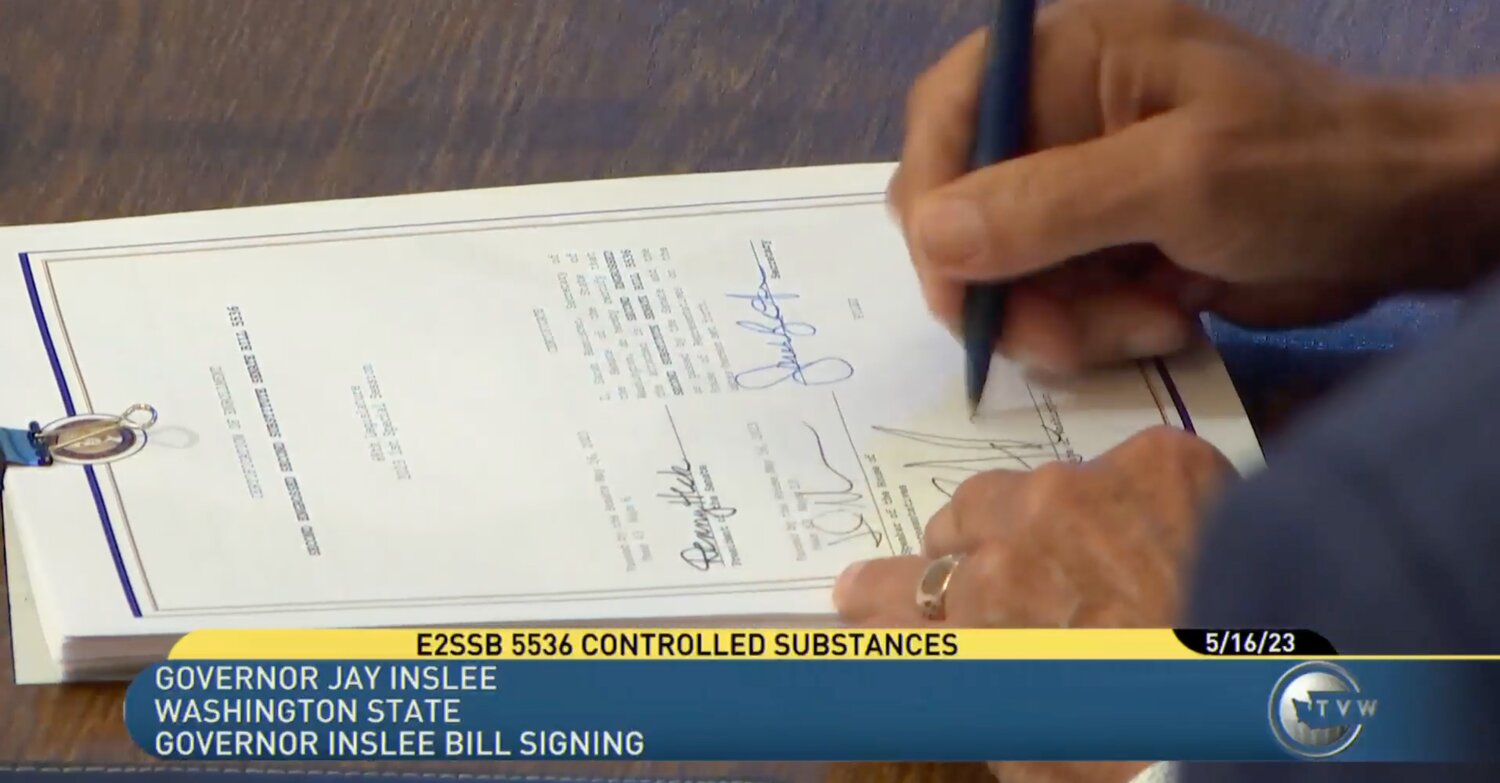
SB 5536, the so-called “Blake Fix,” passed the Washington State Legislature (Legislature) and was signed by Governor Jay Inslee. Its provisions involve the use and possession of drugs. Passage of the bill was welcome news for many Washington cities and counties that were rushing to pass their own ordinances.
The bill makes it a gross misdemeanor to:
- Knowingly possess counterfeit substances and controlled substances (hereafter “prohibited substances”); or
- Knowingly use prohibited substances in a public place.
This bill covers possession and use of counterfeit or controlled substances, or “hard” drugs such as fentanyl and other opioids, methamphetamine, heroin, and cocaine. Also prohibited is the knowing possession of non-prescribed legend drugs, as well as their knowing use in a public place, both classified as misdemeanors. The bill also creates a pre-trial diversion program and almost completely preempts local regulation of drug paraphernalia.
BACKGROUND
In February 2021, the Washington State Supreme Court in State v. Blake. The Blake case was immediately mired in controversy. It declared unconstitutional Washington’s strict liability drug possession law, which criminalized the unintentional, unknowing possession of a controlled substance.
In July 2021 – and in response to the fallout from Blake– the Legislature adopted temporary legislation making it a misdemeanor to knowingly possess prohibited substances. This temporary legislation required that law enforcement refer the individual to assessment and treatment for their first two arrests for simple possession. Upon the third arrest, the individual could be prosecuted. However, this proved nearly impossible for law enforcement to implement, given that there was no state-wide tracking system for referrals.
Fast forward to the 2022-2023 regular legislative session, which ended without passage of a new drug possession and use law. This challenge placed cities and counties in the unfortunate situation of adopting their own patchwork of possession and use laws. However, in a special session on May 16, 2023, the Legislature adopted permanent drug-related legislation in SB 5536.
DRUG POSSESSION & USE ARE GROSS MISDEMEANORS
Both knowing possession of prohibited substances and knowing use of a prohibited substance in a public place are gross misdemeanors. Gross misdemeanors typically have a maximum imprisonment time of not more than 364 days, plus a fine of not more than $5,000.
Knowing possession and knowing use of a legend drug without a prescription remains a misdemeanor. Misdemeanors have a maximum imprisonment time of not more than 90 days, plus a fine of not more than $1,000. An individual cannot be charged with both possession and use relating to the same course of conduct.
Notably, referral or diversion is no longer required. Nevertheless, law enforcement and prosecutors are encouraged to refer or divert such cases for assessment, treatment, or related services. Rather, both possession and use of controlled and counterfeit substances are punishable by imprisonment of up to 180 days or by a fine of not more than $1,000, or both. If the defendant has two or more prior convictions of possession or use, then imprisonment can be increased to up to 364 days (or the $1,000 fine, or both).
REGULATING DRUG PARAPHERNALIA
The bill regulates drug paraphernalia as follows:
- Selling or permitting drug paraphernalia to be sold is a class 1 civil infraction.
- Giving or permitting drug paraphernalia to be given — previously a class 1 civil infraction — is no longer prohibited.
- Using drug paraphernalia continues to be a misdemeanor. See RCW 69.50.412(1).
- Littering or dumping drug paraphernalia continues to be either a civil infraction, a misdemeanor, or a gross misdemeanor, depending on the quantity. See RCW 70A.200.060.
Notably, the definition of drug paraphernalia does not include cannabis-related paraphernalia or drug testing and analyzing equipment. Also, prohibitions on drug paraphernalia do not apply to distribution or use of public health supplies through pharmacies, public health programs, or other authorized community programs.
LOCAL GOVERNMENT ORDINANCES
Many Washington cities and counties have passed ordinances regulating drug possession and use in the absence of permanent state legislation. Those ordinances no longer have any real effect because the state fully occupies and preempts the entire field of setting penalties for violations of the controlled substances act, and local ordinances must be consistent with chapter 69.50 RCW — see RCW 69.50.608. As described in the previous blog section, the state also preempts the field of drug paraphernalia regulation.
However, despite this state preemption, cities must adopt or incorporate state statutes into their municipal code in order to prosecute misdemeanor or gross misdemeanor cases in city municipal court — See City of Auburn v. Gauntt, 174 Wn.2d 321, 274 P.3d 1033 (2012), which held that cities with a municipal court created under chapter 3.50 RCW must prosecute misdemeanors and gross misdemeanors based on city code provisions or RCWs that have been incorporated into the code by reference.
DIVERSION PROGRAMS
The bill creates a pretrial diversion program for individuals charged with simple possession, where the defendant agrees to meaningfully engage in a treatment program in exchange for the state dismissing the charge. The judge must advise the defendant of a program’s availability at arraignment and the prosecuting attorney must consent to the defendant’s participation. Section 9 of the bill outlines all the details, and the Association of Washington Cities (AWC) article, Blake fix bill passes Legislature during one-day special session, provides additional information about the practicality of pre-trial diversion programs.
TREATMENT FACILITIES
Opioid use disorder treatment facilities (with the exception of safe injection sites) are now considered essential public facilities (EPFs). As such, cities and counties can only regulate opioid use disorder treatment facilities in the same manner in which they regulate other EPFs and health care settings. Maximum capacity cannot be imposed on these facilities. See Section 12 of the bill.
Please contact my office if you, a friend or family member are charged with a Drug Offense or any other crime. Hiring an effective and competent defense attorney is the first and best step toward justice.






